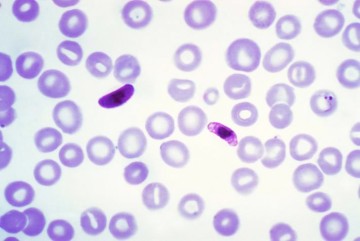Severe malaria is a blood borne parasitic disease that afflicts more than 200 million individuals annually. Even in the best clinical settings, case fatality rates remain high since anti-malarial drugs are directed against the parasite but do not reduce life-threatening (brain) inflammation.

Falciparum Malaria Blood Smear
CBR member Dr. Bob Hancock, Director of the Centre for Microbial Diseases and Immunity Research, has developed innate defense regulator (IDR) peptides as selective modulators of innate immunity. In studies published in the journal Science Translational Medicine (4, 135ra64, 2012), these IDR peptides were assessed as an adjunctive therapy for alleviating severe malaria in a Plasmodium berghei model of experimental cerebral malaria (ECM). Co-administration of IDR-1018 with standard first-line anti-malarial drugs significantly increased survival of infected mice while down-regulating key inflammatory networks associated with fatality.

Co-Author Dr. Laure Janot, PDF in the Hancock Lab
These studies, performed in collaboration with groups from UBC, Ireland and Australia, provides a new strategy forhost-directed adjunctive therapy for severe disease in combination with anti-malarial treatment. If this novel approach works in humans, it may reduce the often devastating consequences of this common disease.
The citation for this work is: Achtman, A.H., S. Pilat, C.W. Law, D.J. Lynn, L. Janot, M. Mayer, S. Ma, J. Kindrachuk, B.B. Finlay, F.S.L. Brinkman, G.K. Smyth, R.E.W. Hancock and L. Schofield. 2012. Effective adjunctive therapy by an innate defense regulatory peptide in a pre-clinical model of severe malaria. Science Transl. Med. 4:135ra64 and can be viewed by clicking here.



Comments are closed, but trackbacks and pingbacks are open.